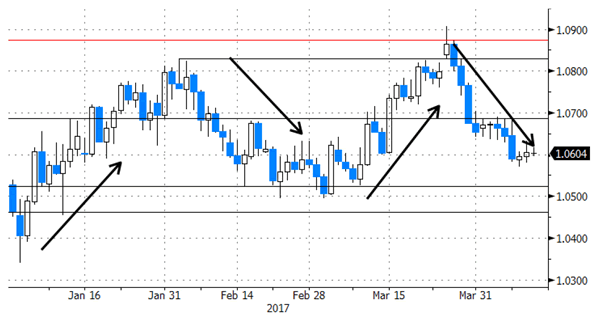Headlines
- US stock markets ended a fairly dull session 0.3% to 0.5% lower, ignoring a late night drop in US yields and the dollar on comments by US president Trump. Overnight, Asian stock markets withstand dollar weakness rather well with Japan underperforming though (-1%).
- US President Trump said the US dollar ‘is getting too strong’ and he would prefer the Federal Reserve keep interest rates low. Mr. Trump, in an interview with The Wall Street Journal, also said his administration won’t label China a currency manipulator in a report due this week.
- US President Trump said he has offered President Xi Jinping more favorable trade terms for Beijing in exchange for help on confronting the threat of North Korea, raising the prospect of a new pact that does less than Mr. Trump would otherwise like to address the US trade deficit with China.
- The Australian economy added 60,900 jobs in March (+74,000 full time jobs; -13,600 part-time jobs), up from a revised 2,800 gain (previously a 6,400 loss) the previous month and compared to a 20,000 forecast. The unemployment rate held steady at 5.9%, in line with expectations.
- China’s exports rose at the fastest pace in a little more than two years in March, climbing 16.4% Y/Y in a further sign that global demand is picking up. Import growth remained strong at 20.3% Y/Y, driven by the country’s voracious appetite for oil, copper, iron ore, coal and soybeans, whose volumes all surged from February despite worries about rising inventories. Crude oil imports hit a record high.
- The Bank of Canada did not even consider cutting interest rates as it left monetary policy unchanged at 0.5% amid signs of strong growth, but it is too early to conclude the economic growth is sustainable, Governor Poloz said.
- Brazil’s central bank slashed interest rates by 100 bps in a decision that could help spur a recovery from the worst recession on record to hit Latin America’s biggest economy. The central bank cut the benchmark Selic rate from 12.25% to 11.25%, stepping its easing cycle.
- South Korea’s central bank stood pat on interest rates amid heightened geopolitical tensions on the Korean peninsula. The Bank of Korea held its 7-day repo rate at 1.25%, where it has been since the bank cut the key interest rate by 25 bps in June 2016.
- Australia’s central bank highlighted vulnerabilities in the country’s skyrocketing property market, warning regulators would consider further tightening lending rules to head off a debt-fuelled bubble in home prices.
Dollar weakens on Trump comments
Trading on currency markets remained also confined to tight ranges yesterday until Trump’s surprising comments. He said: ‘I think our dollar is getting too strong, and partially that’s my fault because people have confidence in me. But that’s hurting—that will hurt ultimately’. He continued, ‘It’s very, very hard to compete when you have a strong dollar and other countries are devaluing their currency.’ In another change of heart, he no longer labels China as currency manipulators, hoping to get them on board in his approach against North Korea.
In the final US trading hour, USD/JPY dropped deeper below 110 support, from 109.80 to 108.80 this morning with some reaction now (109.04). EUR/USD surged from 1.06 to 1.0670. The trade-weighted fell from 100.80 to 100.
Overnight, the US dollar remained in the defensive even if the decline seems to be halting as we approach the European market opening. Today’s eco calendar contains US weekly jobless claims, PPI data and Michigan consumer confidence, but we don’t expect them to impact trading. The earnings reports might affect currencies, especially USD/JPY, via the overall equity climate. If earnings are weak and equities slide away, it would give the yen more upside and push USD/JPY further below the 110 level. Interesting, while Trump’s comments pushed yields and the dollar lower, equities didn’t react at all on this intrinsically equity positive development. Regarding USD/JPY, the short term trend is yen positive (since break below 110) and we shouldn’t yet row against the tide. The Trump comment goes with the trend. We are cautious though as the past yen strength was largely due to its safe haven qualities. If geopolitical tensions ease, the yen may lose again. However, only when the pair breaks through 112.20, we would embrace a dollar positive strategy. Next key support stands at USD/JPY 107.18, the 62% retracement of the previous up-leg. For now, we still prefer a USD/JPY sell-onupticks given recent progress.
EUR/USD jumped on Trump’s comments from 1.06 to 1.0670 followed by sideways trading. We don’t believe that Trump’s comments will have important consequences for EUR/USD short term. The euro is weak too ahead of the French presidential elections and the fate of the dollar depends more on the intrinsic qualities of the currency than on the comments of Mr. Trump, even if he might help shape the underlying conditions via its policy. The Fed is still independent and should continue to tighten policy. We had an above consensus Fed view with 4 rate hikes in both 2017-2018. We might side again on the Fed’s dot plot with 3 hikes in 2017/18, but prefer to not react immediate and instead reconsider the issue after Easter. Technically the overnight move had little significance. So we think that the 1.05 to 1.0907 range is still intact and tactically we still prefer a sell-on-upticks, preferable closer to 1.09.

USD/JPY sets new low after Trump’s comments, dropping further below 110.10 support
